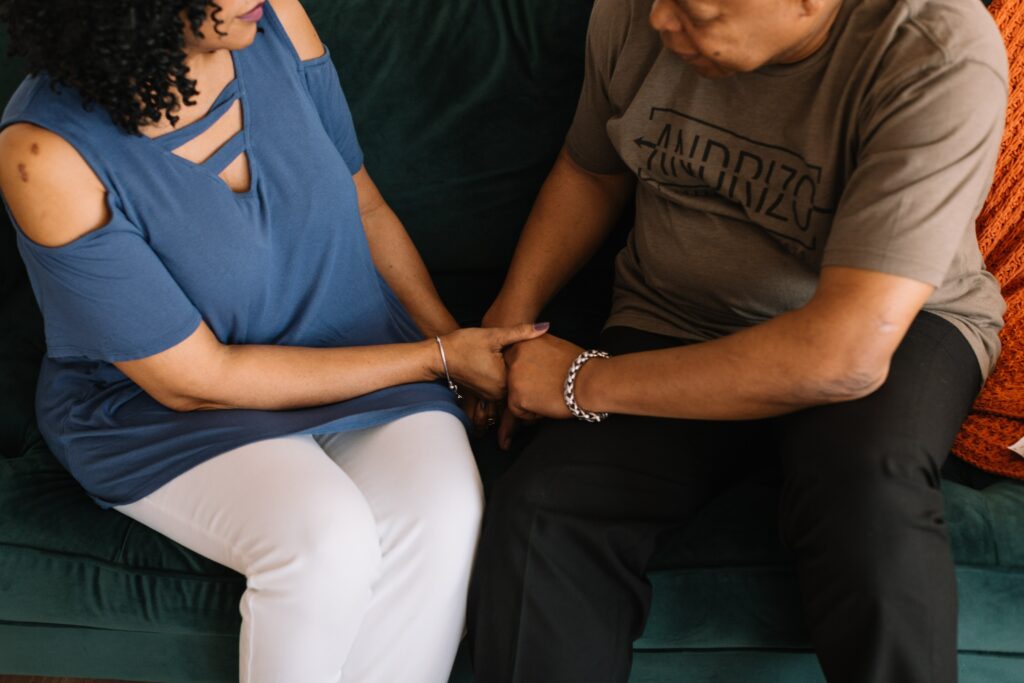With drug addiction on the rise in the US, overdose has become the single greatest risk factor for Americans ages 18-45.
If you’re trying to help a friend or family member who’s struggling with drug addiction, help is available to you. Finding a reputable addiction treatment center is often the difference between life and death for many struggling with substance use disorder.
In this blog, we will outline the steps that are essential to take in order to get your loved one the help they need for drug addiction.
Get Addiction Help for Your Loved One
HOW TO HELP SOMEONE WITH A DRUG ADDICTION
If you notice any of the signs of substance abuse or addiction, it’s time to confront your loved one about getting help. Treatment is available, and many people undergo addiction therapy each year and get sober for the long term. There is hope for your loved one who is addicted to drugs or alcohol. Here are some suggestions for what to do next.
1. DEMONSTRATE COMPASSION
Addiction is a disease and can be treated, just like any other disease. If a loved one has cancer, do you berate or shame them? Do you turn your back on them? Of course not — you run to them and offer support in every way possible. This is what your loved one suffering from addiction needs from you the most: a sense of compassion and understanding.
Often, there are external factors that likely contributed to their addiction, such as stress, mental illness, peer pressure, anxiety, or depression. Addiction can stem from coping mechanisms that were sought to provide temporary relief or a means of escape. Repeatedly seeking relief in this form led to addiction.

2. EXPECT THE CONFRONTATION TO BE HARD
Your loved one may be reluctant to seek treatment for their addiction, even denying that an addiction exists. They may feel shame over their actions, fear of being ostracized, fear of endangering their career or relationships, a desire to avoid the social stigma associated with substance abuse, and more.
Knowledge is power. Educating yourself on addiction and available treatments can give you more tools in your toolbox to help your loved one seek help. Many resources are available from our team at Gratitude Lodge, and also online. Patiently overcoming their objections to addiction with knowledge and understanding can take time. But the alternative is allowing your loved one to destroy themselves.
3. TAKE CARE OF YOURSELF
Self-care is necessary before you can benefit anyone else. Make sure that you are healthy, both mentally and physically. Addiction is tough on everyone, from your loved one to their loved ones and anyone else involved. Seek professional help if necessary. A counselor can provide resources to maintain your own equilibrium, so you are better equipped to help your loved one.
Continue to pursue your own family relationships, career, hobbies and pursuits that are not connected to your loved one battling substance addiction. Time away for yourself is important to recharge and keep yourself well.
4. BE PATIENT WITH THEM
It’s important that you not have unrealistic expectations about your loved one’s recovery from addiction. Recovery from substance abuse is a process, and it takes a different shape and timeframe for every victim. Begin by viewing your loved one’s recovery as an ongoing process that will have highs and lows along the way. Be patient and encouraging at every step.
5. GET PROFESSIONAL HELP
Helping someone you care about overcome drug addiction can be a challenging journey to face without professional guidance for yourself and your loved one.
Without expert care and support, the situation can often become more harmful than helpful, as many people who care about an addicted loved one can sometimes struggle to avoid enabling, as well as keeping their own personal boundaries in place.
It’s important to keep in mind that addiction is a disease, and can cause someone you’ve known your entire life to behave in ways unfamiliar to you. Expert care can look like involving:
- Addiction counselors
- Addiction treatment programs
- Group therapy like AA, which also provides support for loved ones of addicts
To find professional help for your loved one, call our recovery hotline today at (800) 994-2184.
We’ll get you set up with an intervention plan, free insurance coverage check, and all the resources else you need.

UNDERSTANDING THE “WHY” OF ADDICTION
Families with loved ones who become addicted to drugs or alcohol often become angry or confused and blame the addict for their choices. The fact is, everyone makes bad choices; some have greater consequences than others. Drug or alcohol dependence disorders are medical conditions that can be effectively treated. Millions of families like yours have loved ones who are successfully completing a recovery program.
Many people addicted to drugs or alcohol are productive members of society. They maintain careers, relationships, and outside pursuits. This can often create a false hope in the victim and their family that the problem “isn’t that bad” or that there isn’t no problem. Denial is common among those who are addicted to drugs or alcohol.
Different substances have different levels of toxicity and appeal. They also vary in how much must be used before the user forms an addiction. Once a user becomes addicted, they will struggle with personal, professional, financial, and social consequences as a result. Learning more will help you with confronting your loved one about getting help with their addiction.

GET ADDICTION HELP FOR YOUR LOVED ONE AT GRATITUDE LODGE
If you’re trying to help someone overcome drug addiction, it can be a difficult and often draining experience to support them without professional help.
At Gratitude Lodge, we offer compassionate care for your loved one and will walk you through the process of setting up an intervention, providing a free insurance coverage check, creating a customized treatment plan for them, and much more.
Our world-class, people-first program includes addiction treatments like:
-
- Individual and group therapy (CBT, DBT, etc.)
- Medication-assisted treatment (MAT)
- Dual-diagnosis (mental health treated with addiction)
- Adventure therapy (surfing, hiking, beach days, etc)
- Holistic therapy (yoga, art therapy, music therapy, etc)
- & More
Learn more about our programs on our treatments page, or call our friendly team today at (800) 994-2184.





























